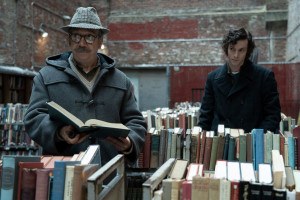A Rare Opportunity to Hear the Greatest English Symphony in Boston

Illustration by Kyle Clauss
Arriving at the stately Brattle Street home of Benjamin Zander, conductor of the Boston Philharmonic Orchestra, I find the maestro in slippers, seated in a cozy leather chair and enraptured by whatever coming through his giant headphones. He’s too overcome with joy for pleasantries, so he hands me the headphones to explain.
It’s a recording of his orchestra rehearsing Sir Edward Elgar’s First Symphony, considered by some to be the greatest ever written by an Englishman. The BPO’s three performances of the piece—February 18 and 21 at Sanders Theatre in Cambridge, February 20 at the New England Conservatory’s Jordan Hall—are a historic event; after debuting in Boston in 1909, the Boston Symphony Orchestra would perform it just seven more times in the next 107 years, and never again with a BSO music director at the helm. In that same span, Brahms’ First Symphony has been played more than 400 times.
I admit to Zander that I don’t know much about Elgar. “Great,” he smiles before depositing a log in the fireplace. “That’s a wonderful place to begin.”
Elgar could be the greatest composer you’ve never heard of. If you’ve ever attended a graduation of any sort, chances are good you’ve heard the first of the “Pomp and Circumstance” marches, which Elgar composed in 1901. “Nimrod” of his Enigma Variations is a funeral standard, played at Princess Diana’s in 1997. He wrote his first symphony at age 50, remarkably late for a composer. (Gustav Mahler wrote his first at 27.) In the middle of its Manchester premiere with the Hallé Orchestra, the audience burst into wild applause following the slow movement, demanding that conductor Hans Richter be brought onstage for an ovation. It was a hit.
The following year, it was performed 87 times. England had long waited for a truly great composer of its own, and Elgar’s First Symphony was definitive proof that one had finally arrived.
Zander, 76, recounts an episode between Richter and the London Symphony Orchestra before one of the 17 times Elgar’s First was performed in the Empire’s capital: “He knocked on his baton before the beginning of the rehearsal and said, ‘Gentleman, we are now going to rehearse the greatest symphony of this era, and not just in England.’ So he was talking about an era that had Mahler, Brahms, Bruckner, Dvorak, Sibelius—all the great symphonies of the 19th century, and he said this symphony is the greatest of all.”
Despite his success, Elgar never quite fit in. He was a Roman Catholic in a Protestant country. The son of a piano tuner, he was never meant for the lofty social stratum in which he’d find himself upon being named Master of the King’s Musick in 1924. Zander compares it to a plotline from Downton Abbey. (“It’s amazing. People have just become obsessed with it.”)
“There was another side to Elgar. He was a very neurotic individual—not as neurotic as Mahler, but highly suicidal. All sorts of anxieties of being left out,” he says. “There was a book written about contemporary composers of the day, and he looked at all the composers of the day, and it didn’t even mention Elgar. He was left out completely. That’s staggering. He was absolutely devastated.”
This tempestuous internal conflict is evident in his First Symphony, explains Zander: “The beginning of the piece has incredibly beautiful, noble theme in A-flat-major—very grand and noble, all about the English world and the courage and the pride and the grandeur of it—and immediately afterward starts this theme in a completely unrelated key, a key which there’s no business being there.”
“So these two worlds are fighting each other constantly, and the beautiful melody, which is a representation of all that’s right with England and with the world, it keeps coming back and poking its nose into the drama of the piece,” he continues. “And at the end of the piece, it finally comes to full glory, but it’s battered like storms of opposition and resistance and terror and fear. When he wins out in the end, the message is, there is a possibility of a world that we want, but it’s a very, very hard journey.”
Zander taps his touchscreen tablet remote a few times, and the regal first movement comes booming over the tower speakers situated on either side of his Steinway piano, which once belonged to his grandmother before she was killed in the Holocaust. I close my eyes and concentrate on the music. “And it’s complete,” he says over the decrescendo. “It never gets developed. It’s just that tune: that representation of a world of possibility.”
At 50 minutes, the First Symphony is complex and demanding on an orchestra, but Zander is confident the Philharmonic is up for the challenge. Upon returning home from rehearsal the previous night, he stayed up until 2 a.m. listening to the recording over and over before retiring to bed. I ask if he ever takes a break and enjoys pop music.
“I don’t much,” he says. “I watched the Super Bowl the other day, and I loved to see Beyonce preening around, but the music seems very trivial and lightweight, and short-lived and without subtlety or complexity or richness. It’s kind of music for Trump, you know? It’s the same level of political discourse.”
The program will pair Elgar’s First Symphony with Robert Schumann’s Manfred Overture and Felix Mendelssohn’s immortal Violin Concerto, two well-known pieces intended draw the audience in for Elgar, the English treasure who suffers from relative anonymity stateside. The first performance Thursday will be part of the Philharmonic’s “Discovery Series,” in which Zander will give a micro-lecture beforehand, helping prime the audience for every last flourish of genius in the piece. After the show, those in attendance can head down to the Queen’s Head Pub and enjoy a drink with Zander and the orchestra, included in the price of admission.
“[Elgar] said it was full of hope. Full of a very great hope for the future,” he says of the piece. “I think it’s very important for music to bring people into the best state of mind possible, particularly around now, when things are so depressing and so discouraging—to have that kind of uplifting and courageous view of the world, looking into the future with courage and great optimism is a wonderful message.”
Tickets for the Boston Philharmonic’s performances of Elgar’s First Symphony, Schumann’s Manfred Overture, and Mendelssohn’s Violin Concerto, featuring Jennifer Frautschi on violin, are available here.


